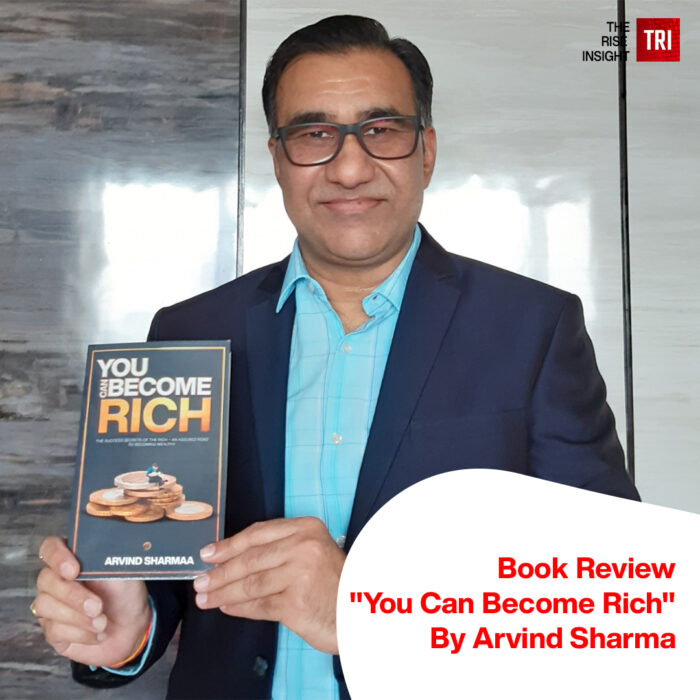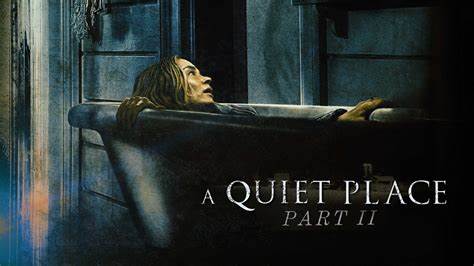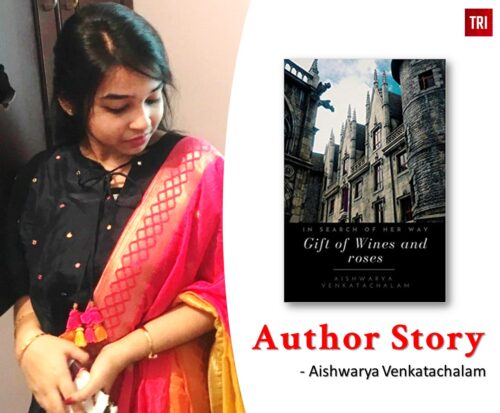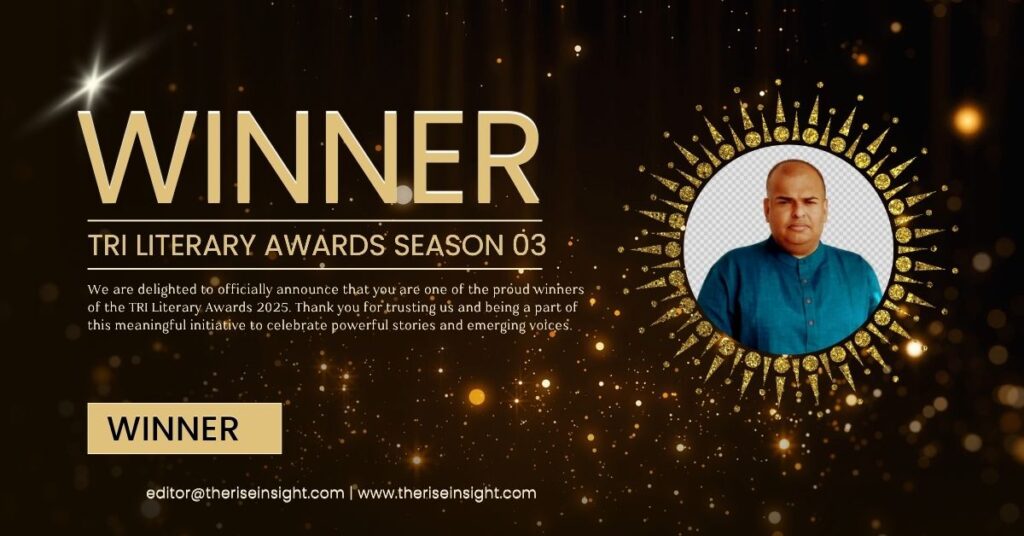
It is with deep admiration and appreciation that I extend a heartfelt congratulations to Kallol Saha for winning the prestigious TRI Literary Awards Season 3 for his remarkable and timely work, Watershed and Me. This accolade is not only well-deserved but also a testament to the powerful blend of science, empathy, and field wisdom that this book embodies. In a world where literature often leans toward the abstract or the sensational, Watershed and Me stands as a grounded, profoundly necessary contribution—a literary watershed of its own.
Table of Contents
ToggleA Grounded Narrative Rooted in Reality
At its core, Watershed and Me is a compelling confluence of scientific insight, lived experiences, and socio-ecological storytelling. It’s not merely a technical guide to watershed development but a human document, illuminating the rich interdependence between people and their environment. The book is as much about rainwater harvesting, soil conservation, and GIS mapping as it is about trust, participation, and quiet revolutions in the remotest parts of India.
Kallol Saha invites readers on a journey that begins in the red soil of Jharkhand and winds through the green ridges of Manipur, the spring-fed slopes of Odisha, and beyond. But more than just a physical journey, this is an ethical and philosophical pilgrimage into the soul of sustainable development.
Narrative Style: The Poetics of Precision
What strikes the reader first is Saha’s narrative clarity—a rare gift in technical writing. He writes with the precision of a geologist and the compassion of a social reformer. The prose is free of jargon-laden heaviness and instead flows like a well-managed stream—calm, purposeful, and full of life. Each chapter is structured methodically, yet the language never becomes dry. Instead, it constantly returns to the human face of development.
The chapters transition seamlessly from theory to practice: from hydrological cycles to village-level planning, from PRA (Participatory Rural Appraisal) tools to case studies of real communities transforming their landscapes. The structure of the book is not only pedagogically sound but also emotionally resonant. Saha is not just teaching here—he is inviting readers to reflect, engage, and care.
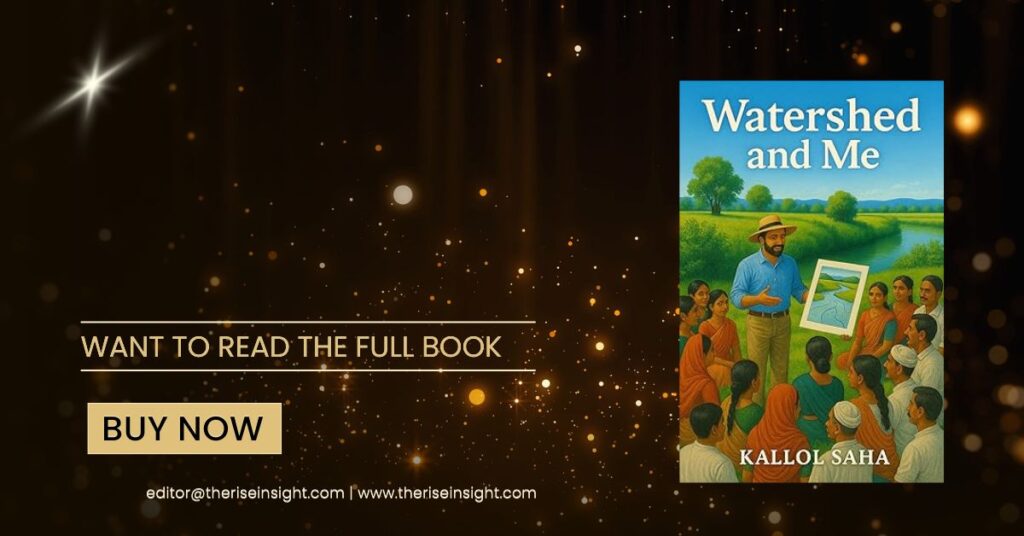
Philosophy and Praxis: The Gandhian Undercurrent
One of the most admirable dimensions of this book is how it integrates Gandhian thought and ecological humility with modern scientific tools. Kallol Saha doesn’t romanticize poverty, nor does he preach utopian green dreams. Instead, he tells the stories of slow, sometimes invisible change—of check dams built not just with cement, but with consensus; of springs that flow again not by miracle, but through meticulous and respectful intervention.
He brings out the subtle beauty of collective action—where village women measure water tables, youth groups map soil erosion, and local institutions become stewards of their own ecosystems. These aren’t tales of big grants or sweeping reforms. They are the stories of small victories—which, in the long run, are the most sustainable kind.
The philosophical reflections—particularly those that question our extractive relationship with land and water—are woven with literary finesse. It’s rare to find a book that can speak equally to a government official, a grassroots worker, and a student of environmental science. Watershed and Me does this effortlessly.
Bringing Science to the People, and People to Science
The technical chapters are remarkable in their accessibility. Whether it’s understanding GIS mapping, hydrological cycles, or the design of contour trenches, the explanations are always accompanied by real-life applications and stories. This democratization of knowledge is one of the book’s greatest strengths.
There is also a detailed analysis of government schemes and institutional frameworks, which the book handles with critical awareness. Saha doesn’t shy away from pointing out inefficiencies or gaps in implementation, but he does so constructively, always with an eye toward solution and collaboration.
Of special note is the chapter on Traditional Ecological Knowledge (TEK), which treats indigenous wisdom with the respect it deserves. In an age where modernization often sidelines local knowledge systems, this recognition is both refreshing and essential.
A Deeply Personal and Ethical Lens
Perhaps the most moving parts of the book are the personal anecdotes—of Kallol’s early days in tribal villages, his learnings from failures, the silent wisdom of barefoot hydrologists, and the transformational power of trust. These moments elevate the book from being just informative to deeply inspirational.
The chapter where he revisits a spring that had once dried up—and now flows again because of a community-led effort—is symbolic of the entire ethos of the book. It’s not just water that is revived, but hope. And in today’s climate of environmental despair, Watershed and Me offers that rare, empirical optimism rooted in ground reality.
Who Should Read This Book?
- Development professionals and NGOs looking for practical and ethical models of intervention.
- Students of environmental science, hydrology, and rural development who want to move beyond theory into lived case studies.
- Policy makers and bureaucrats seeking scalable, community-led frameworks.
- Curious citizens and readers of non-fiction who are eager to understand how real change happens—slowly, humbly, but surely.
This book should be on the shelf of every institution working on sustainability and should be included in curricula for development studies across Indian universities. It serves not only as a reference but as a manual for responsible action.
Certainly! Here is feedback from each of the nine reviewers, reflecting their unique perspectives after reading Watershed and Me by Kallol Saha:
1. Prashant Sahu
“Watershed and Me” is a masterclass in bridging scientific rigor with grassroots narratives. Kallol Saha’s ability to simplify complex watershed concepts while grounding them in real-life stories made this book both enlightening and engaging. As a development practitioner, I found the combination of policy insights and human-centered case studies deeply inspiring.
2. Sameer Gudhate
Reading this book was like traveling through India’s forgotten ecological histories. The vivid storytelling and philosophical undertones remind us that true sustainability lies in humility and community effort. Saha’s blend of Gandhian thought and modern science gives this book a rare depth. It’s more than just a guide—it’s a manifesto for responsible environmental stewardship.
3. Apeksha Gupta
What I loved most about “Watershed and Me” is its heart. While the book is rich with technical detail, it never loses sight of the people at the center of every intervention. The stories of women, farmers, and local leaders leading change were particularly powerful. It reaffirmed my belief that solutions rooted in empathy and participation are the most enduring.
4. Akansha Sinha
Kallol Saha has created a book that is both a textbook and a soul-searching journal. His writing speaks not only to the intellect but also to the conscience. I appreciated the thoughtful reflections on traditional water wisdom and the ethical responsibilities of development professionals. This book is a must-read for anyone serious about sustainable impact.
5. Glenville Asbhy
As someone involved in global development work, I found “Watershed and Me” remarkably relevant beyond Indian borders. The Kenyan case study was a powerful testament to the book’s universality. Saha’s insights on local ownership and ecological balance are principles the world urgently needs to adopt. It’s rare to find such a holistic perspective on water and land management.
6. Pooja Sahu
This book touched me deeply. It’s not often that a technical subject like watershed development can be so emotional and humane. The writing flows like a well-planned stream—nurturing, steady, and full of life. I now look at my own relationship with water and land with more awareness and gratitude. Kallol Saha has truly written a transformative work.
7. Versha Singh
“Watershed and Me” is an extraordinary blend of fieldwork and philosophy. Each chapter felt like a window into a world where change is quiet, slow, but very real. The practical tools and real-life examples make it an invaluable resource for fieldworkers, while the personal anecdotes make it unputdownable. It’s a book I’ll revisit often.
8. Shivangi Yadav
This book broke many myths for me—especially the idea that big change needs big money. Through consistent effort, local knowledge, and participation, Saha shows how transformation can happen one small basin at a time. His humility and field experience shine through every page. It’s both a guide and a source of hope for young professionals like me.
9. Kavita Kaushik
Kallol Saha’s book is like a quiet revolution in print. It reminds us that the most meaningful progress often happens away from headlines—in dusty fields, remote villages, and resilient hearts. “Watershed and Me” is not just a book, it’s a journey—through soil, through stories, and through our shared responsibility toward nature.
Final Thoughts: A Literary Milestone in Development Writing
Kallol Saha’s Watershed and Me is not just a book—it is a movement in the making. It is a call to rethink how we relate to land and water, not as owners or users, but as custodians. It urges us to measure success not in terms of GDP or infrastructure alone, but in the quiet return of a stream, in the smile of a farmer whose well has water again, in the shared effort of a village that believes it can shape its destiny.
This book deserves every bit of recognition it has received, and more. Winning the TRI Literary Awards Season 3 is not just a feather in its cap—it is a beacon for what development literature should aspire to: rigor without rigidity, empathy without sentimentality, and science with soul.
Once again, congratulations to Kallol Saha for this monumental achievement. Watershed and Me is a gift to the present and a guide for the future. 🌍📖💧

